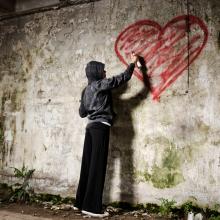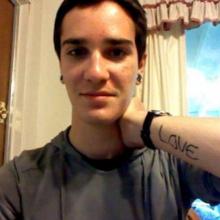LGBT
I had a stew of emotions when I read about an activist group in Portland calling itself the “Angry Queers” vandalizing a satellite church of Mark Driscoll’s Mars Hill network. Neighbors in the area reported seeing a handful of young people in black masks smashing stained glass windows and damaging other property on the church campus early Tuesday morning. A group called the “Angry Queers” sent a letter to a local news affiliate taking responsibility for the damage.
I get the anger. I feel that anger when I read things that pastors like Mark Driscoll say about the LGBT community. It’s wrong and it should be confronted publicly.
But please, for the love of God and one another, not like this.
Pariah, written and directed by Dee Rees. Focus Features.
For decades, Psalm 139 has been a byword of the anti-abortion movement, printed on posters in crisis pregnancy centers. More recently, it's been tied to high-resolution ultrasounds, the movement's most potent technological persuader.
At the same time, the famous Psalm has also "come out" as a source of strength for gay and lesbian Christians.
Together, the two uses illustrate how great verses -- particularly the Psalms -- attract diverse constituencies.
A friend of mine — one who’s wiser and kinder and more thoughtful than I — knows the difficult, painful unweaving I’m talking about. She, too, was carroted down the rabbit trail of a hope-filled future shared with someone, only to discover her bed was left just as cold as the promises she’d so earnestly trusted.
“Falling in love is totally magical and beautiful and gives you this insane ability to operate on 4 hours of sleep a night for a long time,” she said. “It chooses you and that gift is one of life’s best ones. You have to choose it back, though.” She paused, her voice cracking, and I knew she meant it. “At some point, you become more real to each other and the hard work sets in. So you try and try, and even then, sometimes it doesn’t work out. And when that happens, you’ll be ok.” I was looking at her across the table.
“Just let it be sad,” she concluded. “Ironically, sadness will be your guide out of sadness.”
Eric James Borges was teased his entire life for being different. Though he didn’t come out publicly until his sophomore year of college, he recalls emotional and physical abuse as far back as kindergarten for his differences. And though most children undergo some degree of hazing from time to time, the seeming indifference of the adults in his life made matters dramatically worse.
In a video recorded for the “It Gets Better” Project, an LGBT advocacy group focused on offering hope and community to LGBT people on the margins, Borges, 19, recalls being physically assaulted in a full high school classroom while his teacher stood by and watched.
The distressed teen had nowhere to turn at home either. His Christian parents decided to perform a ritual exorcism on him with the hope of “curing” him of his orientation. When that failed, they kicked him out of the house.
Though Borges went on to advocate for LGBT rights through the “It Gets Better” Project and his work with The Trevor Project (a group committed to preventing suicide among LGBT teens), the demons of his past still lingered. Despite finding a community that affirmed and embraced who he was, the damage had already been done.
He killed himself on Jan 11.

Lady Gaga. Image via http://bit.ly/AjdhWA
During all my reading about Robyn and Lady Gaga I came across some stuff about Lady Gaga that I found interesting, theologically speaking. As I told Jana over the summer, "I'm sort of developing a theological curiosity about Lady Gaga." Jana asked, "How so?"
Well, Lady Gaga calls her fans "monsters." Or "little monsters." And by that she means freaks--the odd, the weird, the lonely, the rejects, the nerds, the castoffs. And you can't help but wonder, in light of the gospels, about that demographic. In my book Unclean I have a chapter on monsters. And I've written about the theology of monsters on this blog. Consequently, Lady Gaga's use of the label "monsters" caught my attention.
Because as I've written, the category "monster" is charged with ambivalence. On the surface the monster is a normative threat--a defilement, a degradation, a location of moral and communal harm. Thus, monsters are expelled from community. And yet, most monster stories suggest that the monster is often a scapegoat. That the monster is more victim than victimizer. Underneath, if we could but see it, the monster is one of us.
So it's theologically apt that Lady Gaga uses the category monster for her fans. Because she's targeting a group that has been cast out of society. Again, she's explicitly embracing the freaks, weirdos and social outcasts. But Gaga, like in the monster stories, has flipped this and made the label "monster" a term of affection, welcome, embrace, community, inclusion and hospitality. (The diminutive "little" signals the playful affection.) This parallels my own interests in Unclean--Can we show hospitality toward monsters? So I'm intrigued by Gaga's community of "little monsters."

Gay and happy family. Image via Wiki Commons http://bit.ly/v9yizi
Failure to provide equal rights for LGBT people doesn’t just hurt those who are gay or lesbian, it also hurts the nearly 2 million children who now live in LGBT households.
Contrary to many stereotypes, children living in LGBT households are 50 percent more likely to live in poverty than those living in heterosexual households. Societal prejudice and discriminatory policies both have something to do with it. A recent report sponsored by the Movement Advancement Project, Family Equality Council and the Center for American Progress, explains why.
"The Safety Net Frays" is a nice piece, but we've seen this movie before. The American chattering classes chatter marvelously, but stopped believing in anything of value some 40 years ago. This constant repetition of the same moral-budget complaints, while LGBT rights claimants are left out of our circle of protection, is just one more sign of this.
Jennifer A. Nolan
Newton, Massachusetts
The first few nights weren't so bad. It was on the fourth night, the night it rained, that it got to me. I had just spent the past week sleeping on the sidewalk in front of the Illinois state Capitol building in Springfield. Throughout the week, young people of faith, college students, as well as homeless and formerly homeless youth traveled from Chicago to Springfield. Some slept on the sidewalks at night, and others came solely to lobby their legislators. We were all there for the same reason -- because each year nearly 25,000 youth experience homelessness in the state of Illinois. Not only were there not the resources to help these youth, but most legislators and most of the general public didn't even realize the problem existed.
In the past few weeks, I've written about a lot of full-page ads. This full-page ad is different. Too often, homeless youth have been invisible. The Ali Forney Center, a service provider for LGBT homeless youth, has a full-page ad in this month's issue of Sojourners magazine. GLAAD, the Gay and Lesbian Association Against Defamation, connected the Ali Forney Center to Sojourners, as a part of an advertising campaign the Ali Forney Center is running. The ad highlights that up to 40 percent of homeless youth identify as lesbian, gay, bisexual, or transgender. I have talked with many teens who became homeless because they were kicked out of their homes or ran away from abuse by their parents because of their sexual identity. After their homes became dangerous, they went to the streets, where many were attacked and some were trafficked or forced into prostitution.
Some controversy has arisen about an ad campaign that a new coalition wanted to run in Sojourners on the issue of the LGBTQ community and the church. We chose not to run the ad as this is an issue we want to openly discuss on and through our editorial pages and not through our ad space. Like the larger church, Sojourners' constituency, board, and staff are not of one mind on all of these issues. However, we at Sojourners seek to foster honest, fair, and loving dialogue among Christians. LGBTQ issues may not be our primary calling as our work against poverty and hunger, and for peace, but based on some reactions to our decision, I want to use this as an opportunity to clarify the positions and practices of Sojourners on this important discussion on the life of the church in the early 21st centur
Sunday afternoon, I sat in front of the TV with a box of tissues and watched every second of the "We Are One" concert at the Lincoln Memorial live on HBO.



